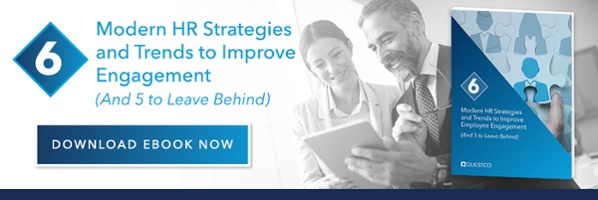
In an age where artificial intelligence is taking over, the human touch in hiring is more valued than ever. The future of HR isn't about replacing humans with machines; it's about leveraging technology to enhance human potential. The rigid structures of yesterday are crumbling to make way for a new era of work, where flexibility isn't a privilege; it's becoming a right. The future workplace is bending to the individual's needs, and the ordinary is becoming extraordinary.
As 2024 approaches, employers must be prepared to navigate a landscape that's not just digital but revolutionary. From skills-based hiring to integrating bots in the recruitment process, the HR field is undergoing an exciting and challenging transformation.
This article will explore four key trends shaping the future of HR, not fleeting fads but harbingers of a future where technology and humanity coalesce.
Emphasis on Skills-Based Hiring
An Accenture study revealed that companies employing skills-based hiring practices experienced a 1% to 2% increase in revenue for every 10% increase in intersectional gender equity. This shift in mindset has led hiring managers to recognize critical job skills and validate them properly, making industry-relevant skills the new degree equivalent.
In the professional setting, skills-based hiring has allowed for a more precise alignment of candidates with specific job roles. For example, 94% of HR decision-makers have trouble finding qualified candidates, impacting business growth. Yet, companies like Apple, IBM, Google, and others have removed bachelor's degree requirements from many positions, focusing instead on the skills necessary for the role.
This shift towards skills-based hiring is not just a trend; it's a necessary evolution in the labor market. It increases equity, allows talented professionals to access opportunities previously restricted by degrees, and enables companies to fill positions with quality talent. It's a win-win situation that's redefining the future of hiring, making skills the new currency of the job market.

Increase in Hybrid Workplaces
The hybrid work model, a blend of in-office and remote work, has emerged as a defining trend in the post-pandemic era. It's a fresh and popular approach that has been embraced by both employers and employees, recognizing the benefits of flexibility and adaptability.
In 2023, 74% of U.S. companies are using or planning to implement a permanent hybrid work model. This shift is not merely a reaction to the pandemic but a thoughtful response to changing work dynamics. Employees have voiced their preference, with 44% favoring a hybrid model, aligning closely with 51% of employers. High-growth companies are leading the way, with 63% adopting a "productivity anywhere" hybrid model.
The appeal of the hybrid model is multifaceted. 55% of employees express a desire to work remotely at least three days a week, enjoying the freedom it offers. This flexibility also has financial implications, with companies saving an average of $11,000 per year per part-time remote worker. The hybrid model also supports mental well-being, with those able to use it during the pandemic reporting less burnout.
Investments in technology are also indicative of the trend's staying power. 72% of companies plan to invest more in tools for virtual collaboration and 70% in IT infrastructure to secure virtual connectivity. This investment clearly shows commitment to a model that enhances productivity and aligns with modern work-life balance.
Employers and employees alike see the value in this approach, making it one of the key HR trends to watch as we move into 2024.
Hybrid Learning and Development
Traditional corporate classrooms have become relics of the past. They've given way to a more dynamic and responsive approach to employee growth: hybrid learning and development. An employee in New York can engage in a real-time collaboration with a mentor in London, all while accessing a rich library of online resources tailored to their unique learning path. That's the reality today.
The shift from conventional to online learning platforms has democratized education within the workplace. It's broken down geographical barriers, allowing for a more diverse and inclusive learning environment. Employees can now choose when, where, and how they learn, aligning their development with personal goals and organizational needs.
But what makes this approach truly remarkable is its adaptability. It's not confined to a one-size-fits-all model. Instead, it molds itself to the learner, offering personalized content, interactive sessions, and real-time feedback. It's about empowering employees to take charge of their growth, explore, experiment, and excel.
The implications for employers are profound. By embracing hybrid learning, you're investing in skills and nurturing a culture of continuous improvement and innovation.
Artificial Intelligence and the Blended Workforce
The dawn of artificial intelligence in human resources is more than technological advancement; it's a paradigm shift. It will soon be possible for bots to conduct initial interviews, and algorithms drive career development. That's not science fiction; it's the reality of HR in 2024.
But this integration of AI doesn't mean the dehumanization of the workplace—quite the contrary. By automating routine tasks, AI frees HR professionals to focus on more complex and empathetic aspects of their roles. It's about enhancing human potential, not replacing it.
Ethical considerations, however, cannot be overlooked. The use of AI must be audited to ensure unbiased algorithms and transparent processes. It's a delicate balance between leveraging technology and maintaining the human touch, a balance that defines the future of HR.

Preparing for 2024
The shift towards skills-based hiring is not just a trend but a reflection of a broader movement that values diversity and individual potential. It's a call to look beyond the resume and see the person, the talent, and the untapped potential. Flexibility in the workplace, once a perk, is now a necessity.
The transformation of learning and development into hybrid models is not merely a response to technological advancement but a realization that learning is a lifelong journey.
And finally, integrating artificial intelligence and the blended workforce is not about replacing humans but enhancing human capabilities.
These four trends are not isolated phenomena but interconnected pieces of a larger puzzle that is shaping the future of HR in 2024. They offer a glimpse into a future where technology and humanity coalesce, innovation meets empathy, and the extraordinary becomes the ordinary.
The challenge for employers is not just to observe these trends but to actively engage with them, to be the pioneers of change, and to lead with vision and values. The future is not just something to predict; it's something to create. And the time to start is now.




